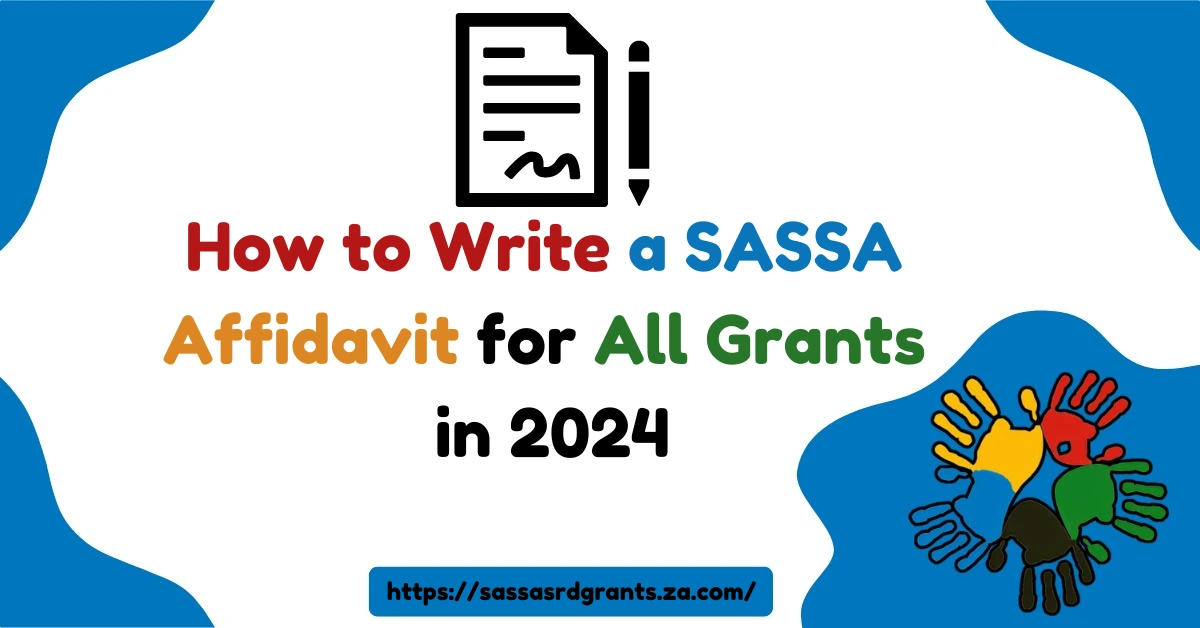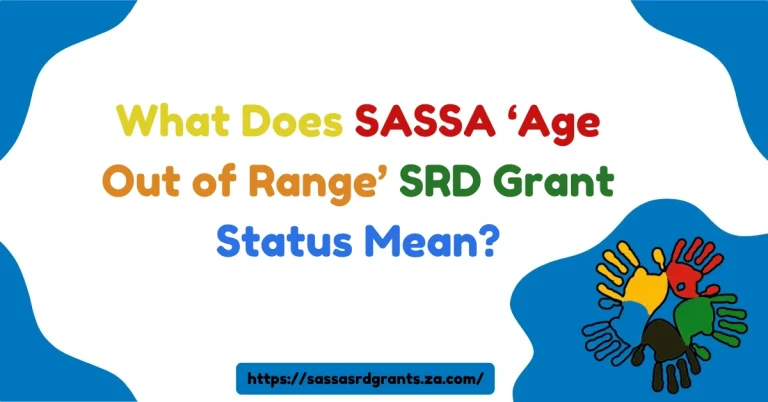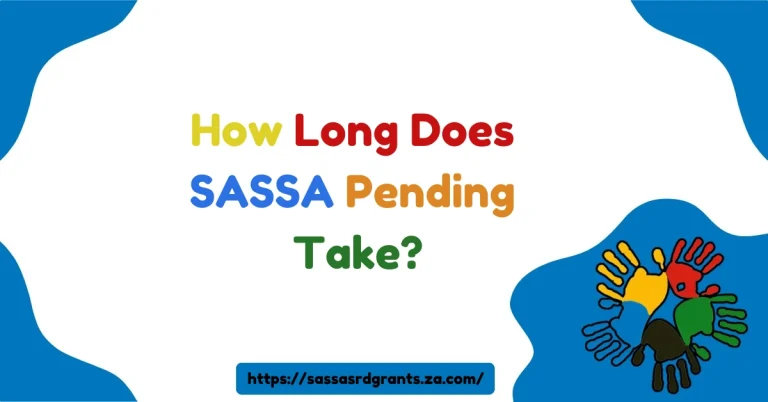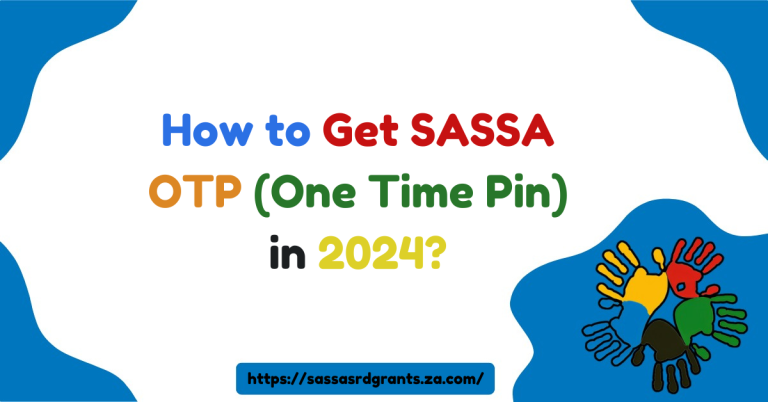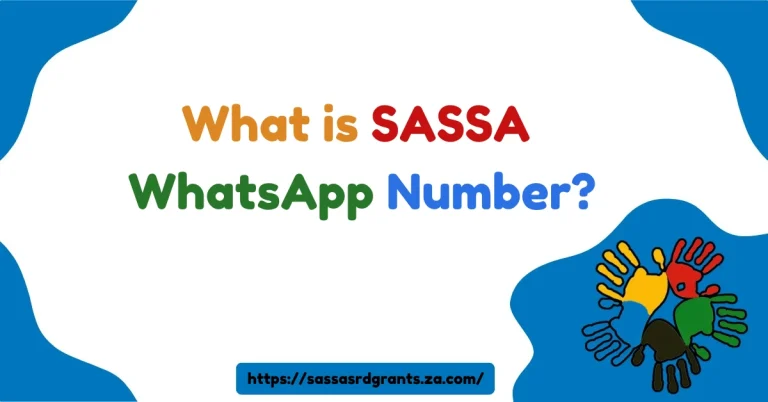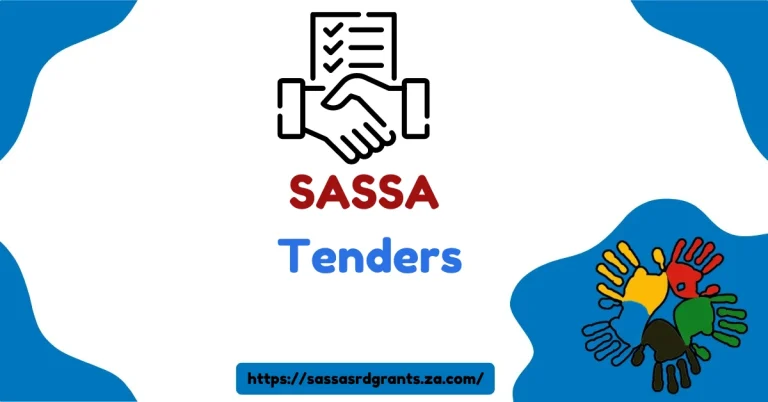How to Write a SASSA Affidavit for All Grants in 2024
In South Africa, the South African Social Security Agency (SASSA) plays a crucial role in providing social assistance to millions of citizens.
One of the essential documents required for various SASSA grants is an affidavit.
This comprehensive guide will walk you through the process of writing a SASSA affidavit for all grants in 2024, ensuring you have the knowledge and tools to navigate this important aspect of the application process.
How to Write a SASSA Affidavit for All Grants in 2024(Quick Answer)
To write a SASSA affidavit for all grants in 2024, include your personal details, ID number, and a clear statement of your financial situation or reason for grant application. Detail any supporting evidence like income or employment status. Sign the affidavit in front of a commissioner of oaths. Ensure it’s legally certified and truthful, as it’s a formal document required by SASSA for grant processing.
[sassa_status]
Understanding SASSA Affidavits
An affidavit is a sworn statement made under oath, affirming that the information provided is true and correct to the best of the declarant’s knowledge.
In the context of SASSA grants, affidavits are used to verify various aspects of an applicant’s circumstances, such as income, employment status, or living arrangements.
SASSA requires affidavits for several reasons:
- To confirm the accuracy of information provided in grant applications
- To serve as supporting documentation when official papers are unavailable
- To declare changes in personal circumstances that may affect grant eligibility
- To provide additional information or clarification during the application process
Understanding the importance and function of affidavits is crucial for anyone applying for or maintaining a SASSA grant.
Types of SASSA Grants Requiring Affidavits
SASSA administers several types of grants, each designed to support different segments of the population. The main grants include:
- Old Age Grant: For South African citizens, permanent residents, or refugees aged 60 and above
- Disability Grant: For individuals with physical or mental disabilities that prevent them from working
- Child Support Grant: For primary caregivers of children under 18 years old
- Foster Child Grant: For foster parents caring for children placed in their care by the court
- Care Dependency Grant: For parents, foster parents, or primary caregivers of children with severe disabilities requiring full-time care
- Grant-in-Aid: An additional grant for recipients of Old Age, Disability, or War Veteran’s grants who require full-time care due to physical or mental disabilities
- Social Relief of Distress: Temporary assistance for individuals in dire need
Each of these grants may require specific affidavits depending on the applicant’s circumstances and the information needed to support their application.
Guidelines for Writing a SASSA Affidavit
When preparing an affidavit for any SASSA grant, there are several key principles to keep in mind:
- Honesty: Always provide truthful information. False statements in an affidavit can lead to legal consequences and disqualification from receiving grants.
- Clarity: Use clear, simple language to convey your message. Avoid jargon or complex terms that might be misunderstood.
- Relevance: Include only information that is directly relevant to your grant application or the specific purpose of the affidavit.
- Completeness: Provide all necessary details without omitting important information.
- Accuracy: Double-check all facts, dates, and figures before finalizing your affidavit.
- Proper formatting: Follow the correct structure and format for an affidavit, which we will discuss in detail later.
- Legal requirements: Ensure your affidavit meets all legal requirements, including proper witnessing and commissioning.
By adhering to these guidelines, you can create a strong, valid affidavit that supports your SASSA grant application effectively.
Step-by-Step Guide to Writing a SASSA Affidavit
Now, let’s break down the process of writing a SASSA affidavit into manageable steps:
Step 1: Gather Necessary Information
Before you begin writing, collect all relevant information and documents related to your grant application. This may include:
- Personal identification details (ID number, full name, date of birth)
- Address and contact information
- Employment history and current employment status
- Income details (if applicable)
- Information about dependents (for child-related grants)
- Medical information (for disability-related grants)
- Any other relevant documentation supporting your application
Having this information readily available will help you create a comprehensive and accurate affidavit.
Step 2: Choose the Appropriate Affidavit Template
SASSA provides standard affidavit templates for various purposes. While these templates are not mandatory, using them can ensure you include all necessary information. Common SASSA affidavit templates include:
- Proof of residence affidavit
- Unemployment affidavit
- Income declaration affidavit
- Caregiver affidavit
- Change of circumstances affidavit
If a specific template is not available for your situation, you can create a general affidavit following the structure outlined in the next step.
Step 3: Structure Your Affidavit
A properly structured affidavit typically includes the following elements:
- Title: Clearly state that the document is an affidavit and its purpose (e.g., “Affidavit for SASSA Old Age Grant Application”).
- Personal details: Include your full name, ID number, and current address.
- Opening statement: Begin with a declaration such as “I, [Your Full Name], ID Number [Your ID Number], do hereby solemnly affirm and declare under oath as follows:”
- Body of the affidavit: Number each paragraph and present your statements in a logical order. Each paragraph should contain a single fact or piece of information.
- Closing statement: End with a statement affirming the truth of your declaration, such as “I confirm that the information provided in this affidavit is true and correct to the best of my knowledge and belief.”
- Signature and date: Sign and date the affidavit.
- Commissioner of Oaths section: Leave space for the Commissioner of Oaths to complete their section, including their stamp and signature.
Step 4: Draft Your Affidavit
Now that you have the structure in place, it’s time to draft the content of your affidavit. Here are some tips for each section:
- Personal details: Be precise and use your official identification information.
Example: “I, John Michael Smith, with ID Number 7501015062087, residing at 123 Main Street, Pretoria, 0002, do hereby solemnly affirm and declare under oath as follows:”
- Body of the affidavit: Present your information clearly and concisely. Use separate paragraphs for different pieces of information.
Example for an Old Age Grant affidavit:
“1. I am a South African citizen born on 1 January 1975, making me 49 years old as of the date of this affidavit.
- I am currently unemployed and have been without formal employment since 15 March 2023.
- I have no other source of income apart from occasional part-time work, which does not exceed R500 per month.
- I am not receiving any other social grants or pensions from the government or private institutions.
- I live alone and am responsible for my own living expenses.”
- Closing statement: Reaffirm the truth of your statements.
Example: “I confirm that the information provided in this affidavit is true and correct to the best of my knowledge and belief. I understand that making false statements in an affidavit is a criminal offense punishable by law.”
Step 5: Review and Edit Your Affidavit
After drafting your affidavit, carefully review it for any errors, inconsistencies, or missing information. Pay attention to:
- Spelling and grammar
- Accuracy of dates, amounts, and other numerical information
- Completeness of information relevant to your grant application
- Clarity and coherence of your statements
Make any necessary revisions to ensure your affidavit is clear, accurate, and comprehensive.
Step 6: Finalize and Print Your Affidavit
Once you’re satisfied with the content of your affidavit, format it neatly and print it on clean, white paper. Use a legible font and ensure there’s enough space at the bottom for your signature and the Commissioner of Oaths’ section.
Step 7: Sign the Affidavit Before a Commissioner of Oaths
The final step in creating your SASSA affidavit is to sign it in the presence of a Commissioner of Oaths. Commissioners of Oaths can typically be found at:
- Police stations
- Post offices
- Banks
- Law firms
- SASSA offices
When you meet with the Commissioner of Oaths:
- Bring a valid form of identification (such as your ID book or card)
- Do not sign the affidavit until instructed to do so by the Commissioner
- The Commissioner will ask you to swear or affirm that the contents of the affidavit are true
- Sign the affidavit in the presence of the Commissioner
- The Commissioner will then complete their section, including their stamp and signature
Specific Considerations for Different SASSA Grants
While the general process for writing an affidavit remains the same, there are specific considerations for different types of SASSA grants:
Old Age Grant Affidavits
For Old Age Grant affidavits, focus on:
- Confirming your age and citizenship/residency status
- Declaring your current living arrangements
- Stating your employment status and any sources of income
- Affirming that you’re not receiving any other pension or social grant
Disability Grant Affidavits
Disability Grant affidavits should include:
- Details about your medical condition or disability
- How your disability affects your ability to work
- Information about any medical treatment or assistive devices you use
- Confirmation that you’re not in a state institution
Child Support Grant Affidavits
For Child Support Grant affidavits, include:
- Your relationship to the child (parent, primary caregiver, etc.)
- Confirmation that the child lives with you
- Details about the child’s other parent (if known)
- Your income and employment status
Foster Child Grant Affidavits
Foster Child Grant affidavits should focus on:
- Confirming your status as a court-appointed foster parent
- Details about the fostered child, including when they came into your care
- Affirmation that you’re not receiving any other grant for the child
Care Dependency Grant Affidavits
For Care Dependency Grant affidavits, include:
- Details about the child’s severe disability or medical condition
- How the disability affects the child’s daily life and care needs
- Confirmation that you’re the primary caregiver for the child
- Information about any medical treatment or special care the child receives
Grant-in-Aid Affidavits
Grant-in-Aid affidavits should focus on:
- Describing why you require full-time care
- Detailing who provides this care and their relationship to you
- Confirming that you’re already receiving an Old Age, Disability, or War Veteran’s grant
Social Relief of Distress Affidavits
For Social Relief of Distress affidavits, include:
- Details about your current financial situation and why you’re in need
- Information about any recent events that have caused your distress (e.g., job loss, natural disaster)
- Confirmation that you’re not receiving any other form of social assistance
Common Mistakes to Avoid
To ensure your affidavit is accepted and processed smoothly, avoid these common mistakes:
- Providing false information: This is not only unethical but also illegal and can result in severe consequences.
- Omitting crucial details: Failing to include important information can delay your application or lead to rejection.
- Using vague or ambiguous language: Be specific and clear in your statements to avoid misinterpretation.
- Including irrelevant information: Stick to facts that are directly related to your grant application.
- Forgetting to sign the affidavit: An unsigned affidavit is invalid and will not be accepted.
- Signing the affidavit before meeting with the Commissioner of Oaths: Always sign in the presence of the Commissioner.
- Using outdated templates: Ensure you’re using the most current SASSA affidavit templates or guidelines.
- Neglecting to make copies: Always keep a copy of your completed and signed affidavit for your records.
Tips for a Successful SASSA Grant Application
While a well-written affidavit is crucial, here are some additional tips to enhance your chances of a successful SASSA grant application:
- Stay informed: Keep up to date with the latest SASSA requirements and procedures for grant applications.
- Gather all necessary documents: In addition to your affidavit, collect all required supporting documents before submitting your application.
- Be honest and transparent: Provide accurate information throughout your application process.
- Meet all deadlines: Submit your application and any required updates on time to avoid delays or rejection.
- Seek assistance if needed: If you’re unsure about any part of the application process, don’t hesitate to ask for help from SASSA officials or community organizations.
- Keep your information updated: Inform SASSA of any changes in your circumstances that might affect your grant eligibility.
- Attend all required appointments: If SASSA requests an in-person interview or assessment, make sure to attend.
- Follow up on your application: Check the status of your application regularly and respond promptly to any requests for additional information.
Frequently Asked Questions (FAQ’s)
1. What is a SASSA affidavit?
A SASSA affidavit is a sworn statement used in applications for various South African Social Security Agency (SASSA) grants. It serves as a legal declaration of your personal circumstances, income, or other relevant information required for your grant application.
2. Do I need an affidavit for every SASSA grant application?
Not necessarily. The need for an affidavit depends on your specific circumstances and the type of grant you’re applying for.
However, affidavits are commonly required for most SASSA grants, especially when official documentation is unavailable or additional information is needed.
3. Where can I get a SASSA affidavit form?
SASSA affidavit forms are typically available at:
- SASSA offices
- Police stations
- Magistrate’s courts
- Some community centers
You can also download templates from the official SASSA website or create your own following the proper format.
4. Who can witness my SASSA affidavit?
Your SASSA affidavit must be witnessed and stamped by a Commissioner of Oaths. This can be:
- A police officer
- A justice of the peace
- Certain bank officials
- Lawyers
- Some post office employees
5. Can I write my SASSA affidavit in any language?
While SASSA affidavits are typically written in English or Afrikaans, you can write your affidavit in any of South Africa’s official languages.
However, you may need to provide a translated version if required by SASSA officials.
6. What happens if I provide false information in my SASSA affidavit?
Providing false information in a SASSA affidavit is a serious offense. It can lead to:
- Rejection of your grant application
- Termination of existing grants
- Legal consequences, including fines or imprisonment
- Being barred from future SASSA applications
Always provide truthful and accurate information in your affidavit.
7. Do I need to renew my SASSA affidavit regularly?
The need to renew your affidavit depends on your circumstances and the type of grant. Generally, you should submit a new affidavit if:
- Your personal circumstances change significantly
- SASSA requests updated information
- You’re reapplying for a grant after a previous rejection or termination
8. Can someone else write my SASSA affidavit for me?
While it’s best to write your own affidavit, you can get assistance if you have difficulty writing or understanding the process. However, the information must be your own, and you must sign the affidavit yourself in front of a Commissioner of Oaths.
9. What if I don’t have all the information required for my SASSA affidavit?
If you’re missing some information, explain this in your affidavit.
State why the information is unavailable and what steps you’ve taken to try to obtain it. SASSA may request additional documentation or verification in such cases.
10. Can I use one affidavit for multiple SASSA grant applications?
Generally, it’s advisable to submit separate affidavits for different grant applications, as each may require specific information.
However, if you’re applying for related grants (like an Old Age Grant and a Grant-in-Aid) at the same time, one comprehensive affidavit might suffice.
11. How detailed should my SASSA affidavit be?
Your affidavit should be detailed enough to provide a clear picture of your circumstances but concise enough to be easily understood.
Include all relevant information but avoid unnecessary details that don’t directly relate to your grant application.
12. What if I make a mistake on my SASSA affidavit?
If you notice a mistake before submitting your affidavit, it’s best to rewrite it. If you’ve already submitted it, contact SASSA immediately to explain the error and provide a corrected affidavit.
13. Do I need to have my SASSA affidavit notarized?
In South Africa, affidavits are typically not notarized but are instead certified by a Commissioner of Oaths. This process is sometimes referred to as “commissioning” the affidavit.
14. Can I email or fax my SASSA affidavit?
Generally, SASSA requires original, signed affidavits. However, during special circumstances (like the COVID-19 pandemic), they may accept emailed or faxed copies. Always check the current requirements with your local SASSA office.
15. How long does a SASSA affidavit remain valid?
The validity period of a SASSA affidavit can vary depending on the type of grant and your circumstances.
Some affidavits may be considered valid indefinitely, while others might need to be updated annually or when your circumstances change.
Check with SASSA for specific requirements related to your grant.Conclusion
Writing a SASSA affidavit for any grant in 2024 requires careful attention to detail, honesty, and a clear understanding of the requirements.
By following this comprehensive guide, you’ll be well-equipped to create an accurate and effective affidavit that supports your grant application.
Remember, the key to a successful SASSA grant application lies in providing truthful, relevant, and complete information. Your affidavit is a crucial component of this process, serving as a legal declaration of your circumstances and eligibility for the grant you’re applying for.
As you navigate the application process, keep in mind that SASSA’s primary goal is to provide social assistance to those who truly need it.
By submitting a well-prepared affidavit and application, you’re helping SASSA fulfill this important mission and ensuring that you receive the support you’re entitled to under South African law.
If you encounter any difficulties or have questions about the affidavit process, don’t hesitate to reach out to SASSA officials or seek guidance from community organizations that assist with grant applications.
With patience, diligence, and attention to detail, you can successfully complete your SASSA affidavit and move forward with your grant application
Conclusion
Writing a SASSA affidavit for grants in 2024 is a crucial step in accessing social assistance in South Africa.
By following the guidelines outlined in this article, you can ensure your affidavit is complete, accurate, and meets all SASSA requirements. Remember to:
- Include all necessary personal information
- Clearly state the purpose of your affidavit
- Provide accurate details about your financial situation
- Have the document properly witnessed and signed
A well-prepared affidavit can significantly speed up the grant application process and increase your chances of approval.
If you’re unsure about any aspect of writing your affidavit, don’t hesitate to seek assistance from SASSA officials or local community organizations.
By taking the time to craft a thorough and honest affidavit, you’re taking an important step towards securing the financial support you need.
Stay informed about any updates to SASSA policies and procedures to ensure your application remains current and valid throughout 2024 and beyond.
Would you like me to elaborate on any part of this conclusion or adjust its tone or content in any way?
